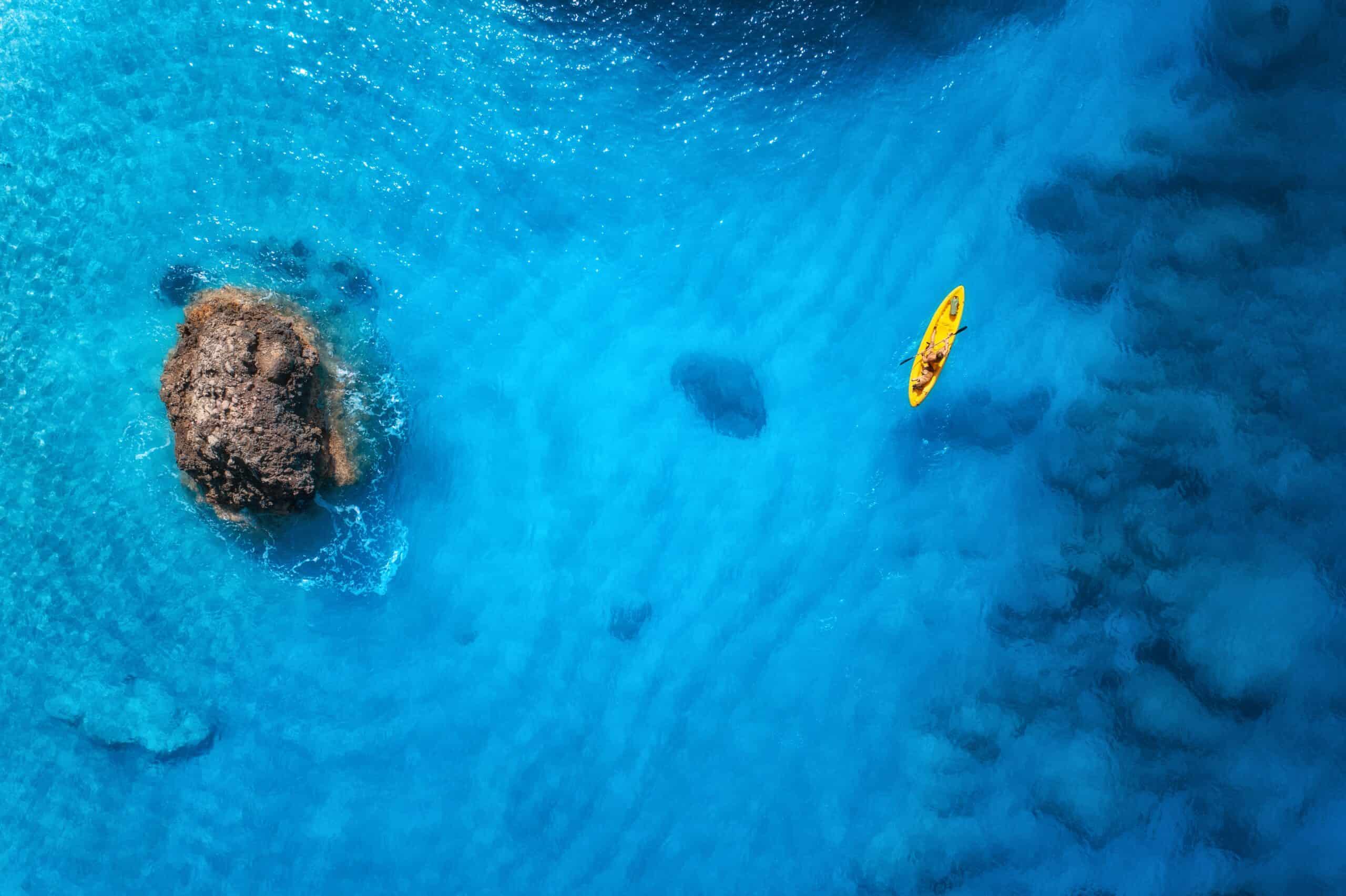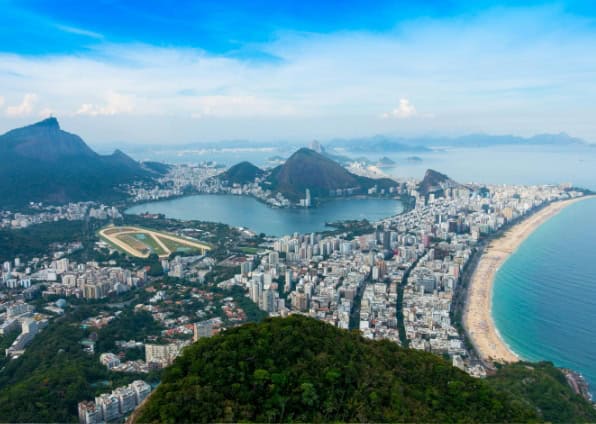
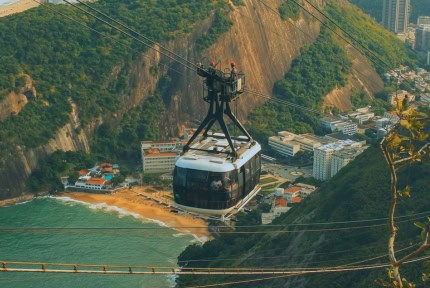
Brazil Travel Guide
In the heart of South America lies a vibrant and diverse culture set amongst stunning landscapes and an unchallenged tradition of celebration.
We’re talking about Brazil—the fifth-largest country in the world and a beloved holiday destination!
The country’s size and mixed heritage allow for unique experiences. Be it boisterous beach days, music-filled night scenes, or rainforest adventures, there’s something special for everyone to enjoy.
To make the best of your Brazilian holiday, we’ll go over what to expect and how travel insurance fits in so you can enjoy your trip without the hassle of unexpected costs.
Best ways to experience Brazil
Brazil exceeds Australia’s size and matches our natural diversity, with sprawling rainforests, towering mountain ranges, and a coastline that seemingly stretches on forever.
Historically, Brazil has weaved a complex tapestry. You’ll find Indigenous, African, European, and Asian influences throughout the country, with specific regions demonstrating stronger roots than others.
Alongside the diverse landscapes, this mixture of identities has given rise to many culinary, musical, ecological, and urban attractions.
To help narrow down your itinerary, here are a few of our favourites:
- Discover São Paulo’s vibrant metropolis – As Brazil’s most populous city, we encourage you to explore São Paulo and get to know its inviting people. For example, you can stop by Paulista Avenue, which becomes a pedestrian zone on Sundays. It attracts street performers, eateries, shops, music, and cafes. Meanwhile, the Museu de Arte de São Paulo (MASP) houses the country’s largest art collections and even hosts concerts. São Paulo’s nightlife also provides an unforgettable experience, with its eclectic mix of rooftop bars, trendy clubs, live music venues, and samba houses.
- Traverse the wondrous Lençóis Maranhenses – The Lençóis Maranhenses National Park is one of the most interesting ecological wonders in Brazil. There, the rainy season fills the rolling sand dunes, creating an almost surreal landscape of freshwater lagoons. Car and horseback riding tours allow you to safely explore the dunes. You can also take part in kite surfing, canoeing, and swimming.
- Get to know Manaus and the Amazon – The city of Manaus resides within the Amazon rainforest, making it the perfect gateway to riverboat tours and canopy exploration. You’ll also discover the great Amazon Theatre in Manaus, home to the annual Festival Amazonas de Ópera. If you want to get away from the significantly busier beaches of Rio, Manaus’ Ponta Negra Beach is a welcome reprieve. Beyond that, you can go out to see the Meeting of Waters—the point where the Amazon and Solimões rivers meet—as you move deeper into the jungle wonderland.
- Live it up at a genuine Brazilian carnival – Carnival (also spelled carnaval) is arguably one of Brazil’s biggest attractions. It’s celebrated across the country, starting on Friday afternoon before Ash Wednesday and ending on Ash Wednesday itself. Massive floats, wild adornments, samba schools, trained dancers, and intoxicating music come together for an unforgettable explosion of colour, rhythm, and joy. Rio de Janeiro’s carnival is the most famous event, though any celebration is likely to be exciting as thousands get swept in a true expression of Brazilian culture.
Visiting Brazil
Climate
Brazil sees a mixture of equatorial, tropical and subtropical climates with some interesting exceptions.
North Brazil, for instance, is hot and humid. Anticipate rainfall, particularly during the wet season. Heavy rainfall often triggers landslides or flooding, so if you plan to travel during this period, stay up to date on weather alerts and avoid heavily impacted areas.
In contrast, some parts of northeast Brazil see minimal rain due to a semi-arid climate, while the high plains of the southernmost region—the states of Paraná, Rio Grande do Sul, and Santa Catarina—occasionally see snow, though this is rare.
The best time to visit Brazil varies. We recommend visiting between May and September for most regions, as this period generally offers milder temperatures and less rainfall.
Culture and language
The national language of Brazil is Brazilian Portuguese, which is distinct from what is spoken in Portugal. There are also many minority languages, but English isn’t widely spoken. Natives who speak English are generally found in urban areas, though fluency varies.
To get around more easily, learn a few phrases and download a reliable translation app. Don’t be afraid to ask questions. The Brazilian people have a reputation for being warm and inviting, potentially thanks to their diverse cultural heritage.
In fact, many people can trace their family background to multiple ethnic groups that had a formative influence on modern Brazil. Consequently, you’ll discover different cultural practices and mannerisms across the nation.
Do your research on regional sensitivities as needed, but in general, expect Brazilians to be relaxed and tactile. It’s common to exchange handshakes, hugs, and kisses with people you know. Additionally, Brazilians often call others by their first name or nicknames, depending on the situation.
Getting around
Renting a car is one easy way to get around Brazil. As long as you have a valid licence and a translated copy, Australians can drive in Brazil for up to 180 days. After 180 days, you’ll have to register for a local licence.
For a more budget-friendly option, buses support inter-city and cross-country travel.
Buses within major cities like Rio de Janeiro and São Paulo are part of a well-developed network, though petty theft isn’t unheard of. Never leave your belongings alone or travel to dangerous areas.
Meanwhile, longer commutes are available through overnight buses. Booking dedicated tour buses is also often a safe and more convenient option.
Otherwise, boats such as ferries and riverboats can take you across the Amazon or to Brazil’s tropical islands. Never go anywhere without a guide if you’re interested in more remote areas (be it on water or land).
Accommodation
Accommodation is plentiful across Brazil. The popular choice for most travellers is a reputable hotel in a major city. Hotels range from small, local businesses to luxury chains. Book ahead as the holiday season often brings price markups.
For smaller selections, pousadas (meaning “place to land”) are worth consideration. They’re similar to bed and breakfasts or inns. Quality can vary, but popular choices offer comfort, character, and privacy at a lower price point compared to hotels.
For budget selections, albergues or hostels are cost-effective. Look up reviews before booking one, however. Select popular, busy options to stay safe.
Finally, lodges are available in the Amazonas and the Pantanal. Preferred by travellers venturing into the rainforest, lodges usually offer a more immersive nature experience.
Entry requirements
Australians don’t require a visa to enter Brazil. While there, you can stay for 90 days and extend your visit for another 90.
That said, you may need a yellow fever vaccination certificate to enter. Contact your doctor to learn more as some airlines may request a copy of the certificate. Additionally, you will need to carry ID while in Brazil. Bring your licence (if valid) or a photocopy of your passport.
To learn more, visit the official Smartraveller website. Stay up-to-date on travel requirements or alerts before you leave and throughout your holiday.
^When on-trip claim has been approved, using the PassportCard, *An extra premium may be charged for pre-existing medical conditions of your dependants. **Various limits apply (Basic has limited covers), ~Comprehensive policy only,
All benefits and covers are subject to the terms, conditions, limitations and exclusions listed in the Combined Financial Services Guide and Product Disclosure Statement and on other policy documentation, including the schedule.
Brazil travel insurance FAQs
It’s always a good idea to get travel insurance when travelling to Brazil. That way, you know you have protection if something doesn’t go to plan. Whether it’s lost luggage, travel delays, trip cancellations, or unexpected medical or dental emergencies, a dedicated travel insurance policy is useful in many situations. Opting for a policy that includes instant claims also provides convenience so you can quickly cover the most common travel claims.
The best way to find out how much it will cost to get cover to travel to Brazil is to get an instant quote with PassportCard. It only takes a couple of minutes to get a personalised quote by providing some basic details such as your age, destination/s, travel dates and the level of cover you would like.
No. Many Australians don’t realise that they won’t be covered by Medicare when overseas. Purchasing travel insurance with cover for medical emergencies and evacuation is essential to ensure you won’t be left to foot the bill if you become seriously sick or injured while travelling.
Not automatically. If you’re planning on doing any activities like cascading, deep sea fishing, mountain biking, mud buggying, paragliding, quad bike riding, outdoor rock climbing, segway tours or sky diving, you’ll need to add Optional & Adventure cover for these activities when you purchase your travel insurance to make sure you’ll be covered.
Simply call our Global Assistance team on +61 1800 490 478 or contact us on WhatsApp. Our Australian-based Global Assistance team is available 24/7 and can quickly handle most common claims on-the-spot over the phone.
Preparing for your trip to Brazil
Ready for your trip to Brazil?
Here are a couple of items you should check off your list before you leave:
- Ensure that your passport is valid for at least 6 months beyond your intended departure date
- Speak to your doctor to find out if you require any travel vaccinations. You also need to take measures to protect yourself against measles, dengue, malaria, yellow fever and Zika virus in particular. You may also need to provide a yellow fever certificate to enter or leave the country
- Be cautious of food-related and waterborne illnesses. Only eat and drink at reputable restaurants
- Carry proof of identity on you at all times. A driver’s licence or a photocopy of your passport is recommended
- Do not travel to dangerous areas or travel alone at night. Stay safe and aware during busy tourist periods, as mugging, armed robbery and carjacking are common. Report any incidents to the local authorities as soon as possible
- Watch out for petty crime. Never leave your personal items alone in public areas or on public transport. Only stay at reputable accommodation
- Notify your financial institution of your plans to travel
- Set up a travel currency card or another payment option before your trip. While most places accept debit or credit cards, it’s a good idea to carry some Brazilian real (BRL) in case of emergencies. Secure any cash on your person while travelling
- Contact your phone provider to ensure your phone plan will cover you while you’re away or purchase a prepaid international sim card
- Book tours, activities, and reputable accommodation in advance
- If you’re travelling solo, provide details of your travel plans to a family member or close friend so you can be contacted in case of an emergency
- Save emergency numbers and consular assistance contact details. Create safety plans and educate your children on what to do if you’re separated
- Organise your travel insurance with PassportCard.
Get covered for your trip to Brazil with PassportCard

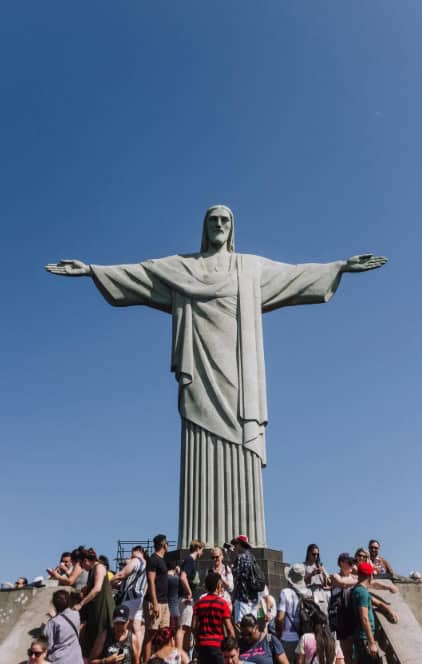
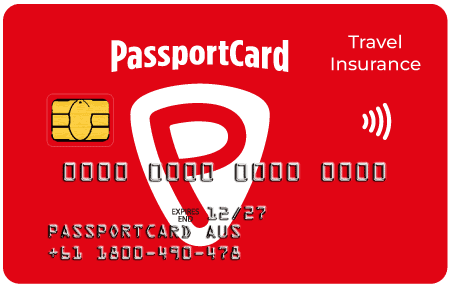
Instant payouts on approved claims with PassportCard
When you choose PassportCard, you’ll enjoy the extra peace of mind of knowing you’ll be able to cover most expenses there and then if something goes wrong.
When you purchase one of our travel insurance policies, we’ll ask you if you’d like a PassportCard to take with you on your trip. If something happens while you’re away (like your luggage is delayed, your cash is stolen or you experience a medical issue), our team can handle your claim quickly over the phone and transfer funds to your PassportCard on-the-spot**.
If approved, you’ll be able to withdraw cash to cover expenses that can arise from things like delayed luggage or stolen cash, or if it’s a medical issue, we can instantly add funds to your PassportCard so you can immediately pay for expenses when you need to.
You won’t need to fill out any paperwork and instant access to funds means you won’t be left out of pocket.
Find out more about how instant claims work or get a quote for your upcoming trip.


